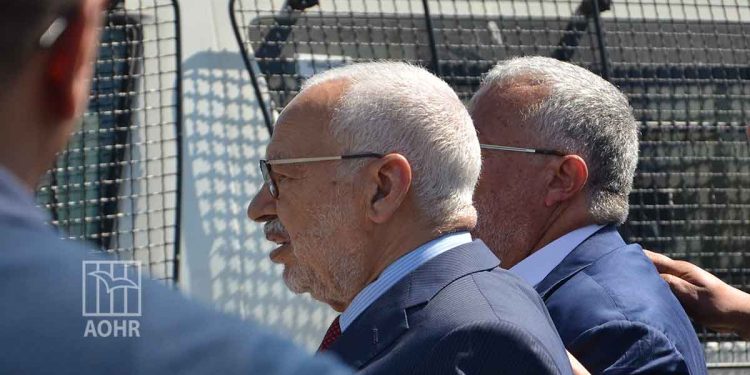On the 100th day of Rached Ghannouchi’s imprisonment, 800 public figures from 60 countries expressed their full solidarity with the head of the “Ennahda” movement and the president of the dissolved Tunisian parliament, Rashid Ghannouchi.
The petition was signed by prominent Tunisian former President Mohamed Moncef Marzouki, former Moroccan government heads Abdelilah Benkirane and Saad Eddin El Othmani, Egyptian politician Ayman Nour, head of the Union of Egyptian National Forces, Tariq al-Hashemi, former Iraqi vice president, and former president of the Turkish parliament, Mustafa Sentop.
They called on “the Tunisian authorities to immediately release Ghannouchi and the rest of the political detainees, grant them freedom, preserve their dignity, respect their rights, and end the abusive policies.”
On April 17, Tunisian security arrested Ghannouchi after raiding his house in Tunis, in the case about “statements he made against the Tunisian security. On May 15, a Tunisian court sentenced him to one-year prison and a fine.
The signatories to the petition stated that “Ghannouchi is a thinker and politician known for being one of the most prominent theorists of compatibility and coexistence between Islam and democracy, and he played an important role in Tunisia’s transition towards freedom and democracy after the revolution.”
The United Nations spokesman Stephane Dujarric expressed “grave concern” over the arrest of Ghannouchi, political leaders and civil society leaders, and the storming of Ennahda’s offices.
Stephane Dujarric stressed “the need for the president and the government in Tunisia to adhere to the rule of law and due legal procedures, including the right to fair trials and the International Covenant on Civil and Political Rights, to which Tunisia is a party,”. He emphasised the need to release all arbitrarily detained persons, including those held simply for exercising their right to expression and assembly.
Since July 25, 2022, Tunisia has been going through a political crisis, as President Kais Saied took a series of decisions, which included freezing the parliament, lifting the immunity of MPs, issuing legislation by presidential decrees, dismissing the prime minister, and assuming the executive power with the assistance of a government.
Since then, officials, parliamentarians, parties, judges, jurists, journalists and media organisations in Tunisia have been subjected to harassment, security prosecutions, arrests and judicial follow-ups.






























